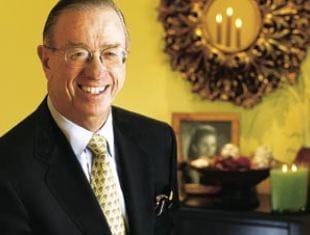 “Kaizen” is a Japanese word that Bob Goergen likes to use to explain his approach to business. He came across the word—denoting “gradual change”—when reading about Japanese management practices. “I use it to differentiate between great leaps forward and thoughtful, gradual changes where your likelihood of success is much higher,” he explains.
“Kaizen” is a Japanese word that Bob Goergen likes to use to explain his approach to business. He came across the word—denoting “gradual change”—when reading about Japanese management practices. “I use it to differentiate between great leaps forward and thoughtful, gradual changes where your likelihood of success is much higher,” he explains.
Goergen, chairman and CEO of Blyth Inc., a Wharton Overseer, and the namesake of Wharton’s Goergen Entrepreneurial Management Program, has built a remarkable career on this concept. Indeed, prudent risk-taking helped Goergen transform
Blyth from a small candle maker ($2.8 million in sales) into one of the nation’s largest home-accessories companies ($1.6 billion in 2006 sales). Goergen had an entrepreneur’s eye for calculated risk from the start. As a rookie at the advertising agency McCann-Erikson, he updated Coca-Cola’s marketing campaign by hiring the Supremes to sing the Coca-Cola theme—a replacement for the aging sound of the Limeliters.
He followed with a stint as a management consultant at McKinsey & Co., and next at Donaldson Lufkin & Jenrette, with the Sprout Group. When Goergen became the managing partner at Sprout, he began to make what he calls “hobby investments”—that is, deals that were too small to interest Sprout. In 1976, he came across a Brooklyn, NY, firm called Valley Candle Co. Goergen and three friends put up a total of $50,000. He then raised $300,000 more from other friends and family members. That enabled the partners to persuade Chemical Bank to lend them $650,000 more. They bought Valley for $1 million.
Within a year, Goergen heard that another candle company—Candle Corp. of America in Chicago—was for sale. This time, the price was $3.3 million. Goergen again called on his network. To get a large enough loan, he had to pledge his personal assets, too. Goergen decided to step up his involvement to protect his investment—in 1978, he quit his managing partner job and became a full-time candle maker.


























